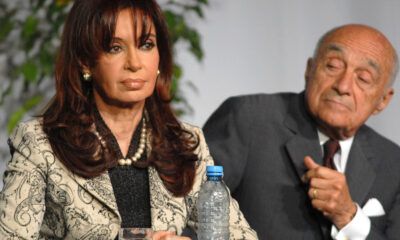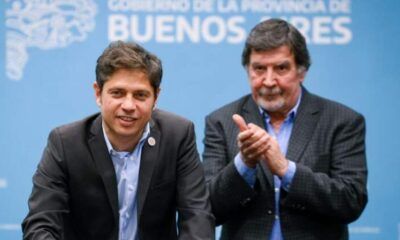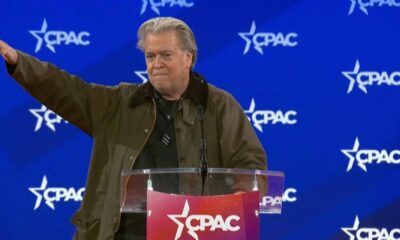INTERNACIONAL
Conservative candidate pulls ahead in German election, according to early exit polls
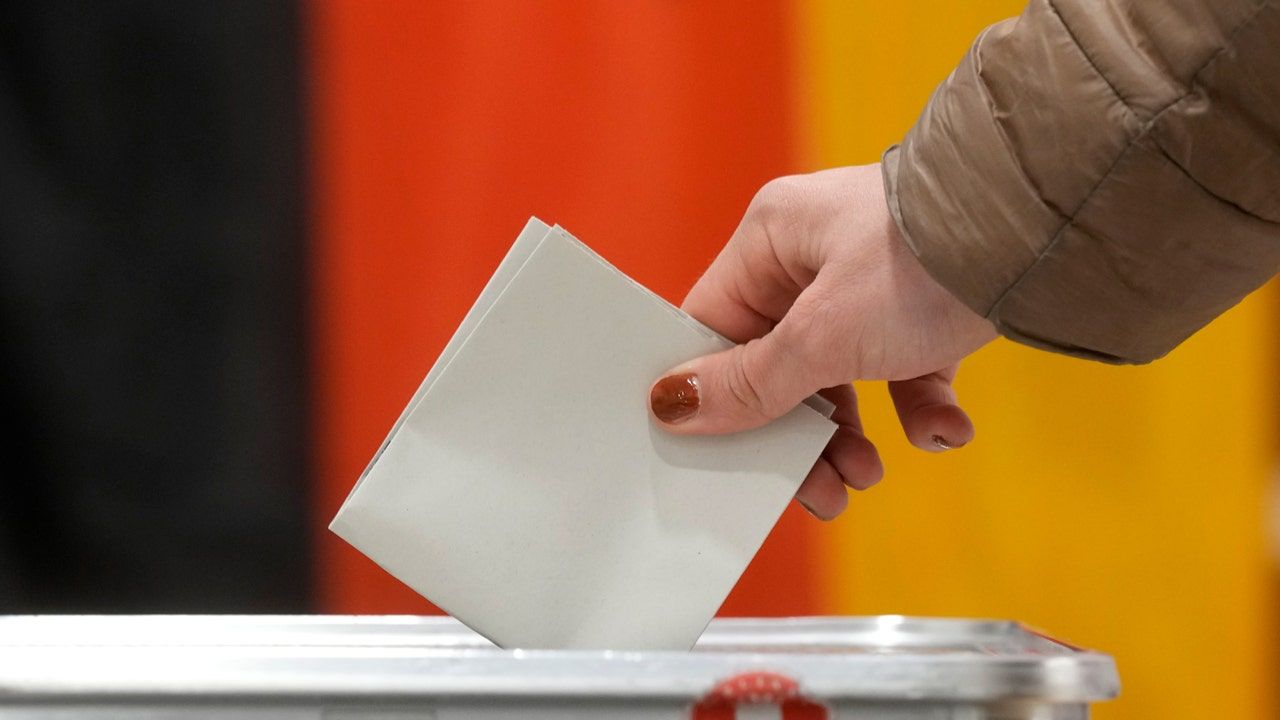
- In Germany’s national election on Sunday, center-right opposition leader Friedrich Merz claimed victory after exit polls showed his bloc in the lead.
- Alternative for Germany, or AfD, is heading for the strongest showing for a far-right party since World War II.
- German Chancellor Olaf Scholz conceded defeat in the election after exit polls showed his center-left Social Democrats on track to come in third place.
German voters cast their ballots in Sunday’s election, with opposition leader Friedrich Merz claiming victory. Exit polls also indicate that Alternative for Germany, or AfD, is heading for the strongest showing for a far-right party since World War II.
The election came as Germany and the rest of Europe grapple with the new Trump administration, the Russia-Ukraine war and security across the continent.
Here’s the latest:
Scholz concedes defeat
German Chancellor Olaf Scholz has conceded defeat in his country’s national election after exit polls showed painful losses for his party.
Scholz told supporters that «this is a bitter election result» for his center-left Social Democrats and «this is an election defeat.»
A resident casts a vote at a polling station in Berlin, Germany, on Feb. 23, 2025, during the German national election. (AP Photo/Michael Probst)
Center-right opposition leader Friedrich Merz claims victory
Center-right opposition leader Friedrich Merz claimed victory in Germany’s national election after exit polls showed his bloc in the lead.
Merz said that he was aware of the dimension of the task he faces and said that «it will not be easy.»
Merz said he aims to put together a governing coalition as quickly as possible.
Exit polls show Merz leading, AfD making big gains
German exit polls show opposition leader Friedrich Merz’s conservatives leading in the election, while Alternative for Germany is heading for the strongest showing for a far-right party since World War II.
The exit polls for ARD and ZDF public television show Chancellor Olaf Scholz’s center-left Social Democrats on track for their worst postwar result in a national parliamentary election, and expected to be in third place.
The election was dominated by worries about the years-long stagnation of Europe’s biggest economy, pressure to curb migration and growing uncertainty over the future of Ukraine and Europe’s alliance with the United States.
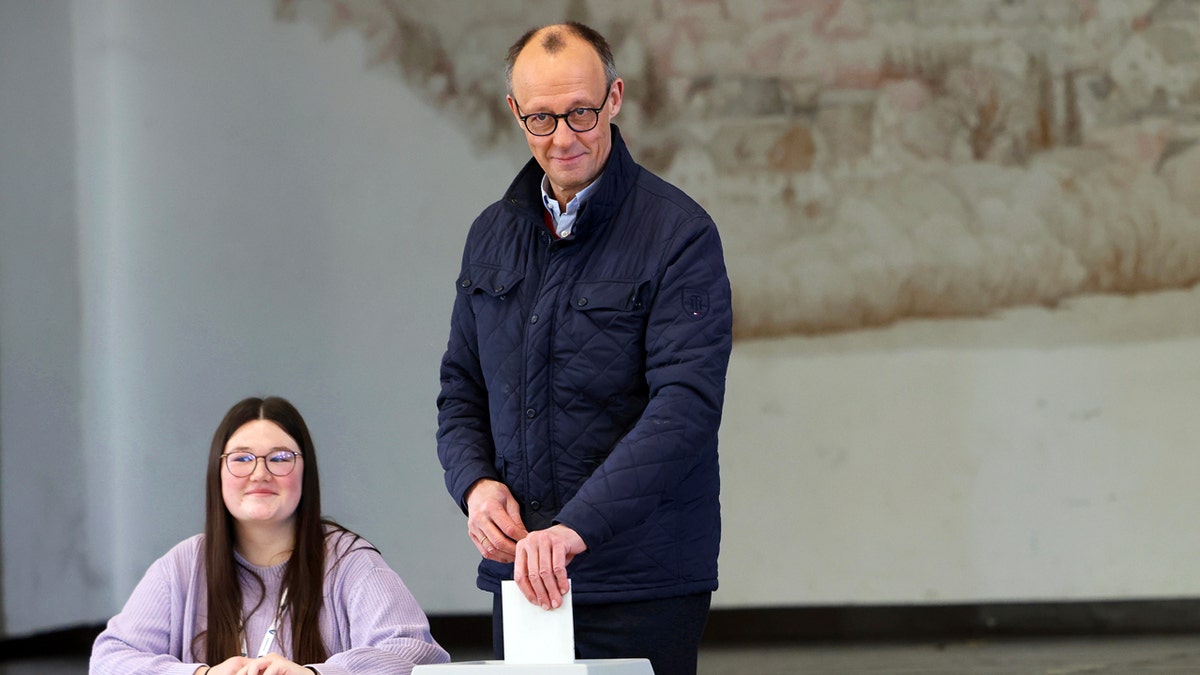
Friedrich Merz, leader of the Christian Democratic Union (CDU), casts his vote at a polling station Arnsberg-Niedereimer, Germany, on Feb. 23, 2025, during the national election. (Oliver Berg/dpa via AP)
Polls will close shortly
Polls across Germany will close at 6 p.m. local time (1700 GMT).
Exit polls are expected to be released immediately afterward.
The candidates for chancellor will also likely address their members at parties across the country.
Pubs among 2,300 polling stations in Berlin
Citizens in the German capital are casting their votes in traditional polling stations like schools, kindergartens, gyms or retirement homes.
But there are also some unusual voting locations in Berlin, local broadcaster RBB reports, including car dealerships, restaurants and pubs.
About 2.43 million people are eligible to vote in the city.
Getting ready to count postal votes
Election workers in Munich are preparing to count postal votes by spreading pink envelopes on a big table.
Letters can be opened starting at 3 p.m. local time (1400 GMT) and the actual count begins at 6 p.m. (1700 GMT) when polling stations have closed.
Turnout is 52% hours before polls close
Germany’s election authority says 52% of eligible voters had cast their ballots four hours before polling stations close.
The authority said the figure for turnout by 2 p.m. local time (1300 GMT) didn’t include people who voted by postal ballot. It compares with 36.5% at the same time in the 2021 election, but many people cast absentee ballots in that vote, which took place during COVID-19 restrictions.
Turnout is typically high in German elections. The final turnout figure in the 2021 election was 76.4%.
Colors of a coalition
Chancellor Olaf Scholz’s coalition was an alliance of the Social Democrats, Greens and Free Democrats.
The grouping is known as the «traffic light» coalition because of the combination of red, green and yellow party colors.
The colors of the parties running in Sunday’s election are black (Union bloc), red (Social Democrats), green (the Greens), yellow (Free Democrats) and blue (AfD).
The new government could be a «Kenya» coalition (Union bloc, Social Democrats, the Greens) or a «Germany» coalition (Union bloc, Social Democrats, Free Democrats).
More than 500,000 newly naturalized Germans are eligible to vote
Almost a third of the new Germans are originally from Syria. Most of them left their home countries in the last decade, fleeing war, political instability and economic hardship. In 2015-2016 alone, more than 1 million migrants came to Germany, most from Syria, but also from Afghanistan and Iraq.
Since the last national election in 2021, the number of naturalizations in Germany has risen sharply.
For the new Germans originally from Syria, the election is weighted with extra significance. Many of them fled their country because of the civil war that followed former President Bashar Assad’s crackdown on protests calling for greater democratic freedom. He was toppled in November, but whether Syria will now become a democracy remains unclear. In the meantime, they are able to vote in multi-party elections in their new home.
How quickly will a governing coalition be formed?
There is no formal referee for the process of forming a new government, and no set time limit.
Conservative leader and front-runner Friedrich Merz has said he hopes to form a new government by mid-April if he wins.
Chancellor Olaf Scholz’s outgoing government will remain in office on a caretaker basis until the Bundestag elects the new chancellor.
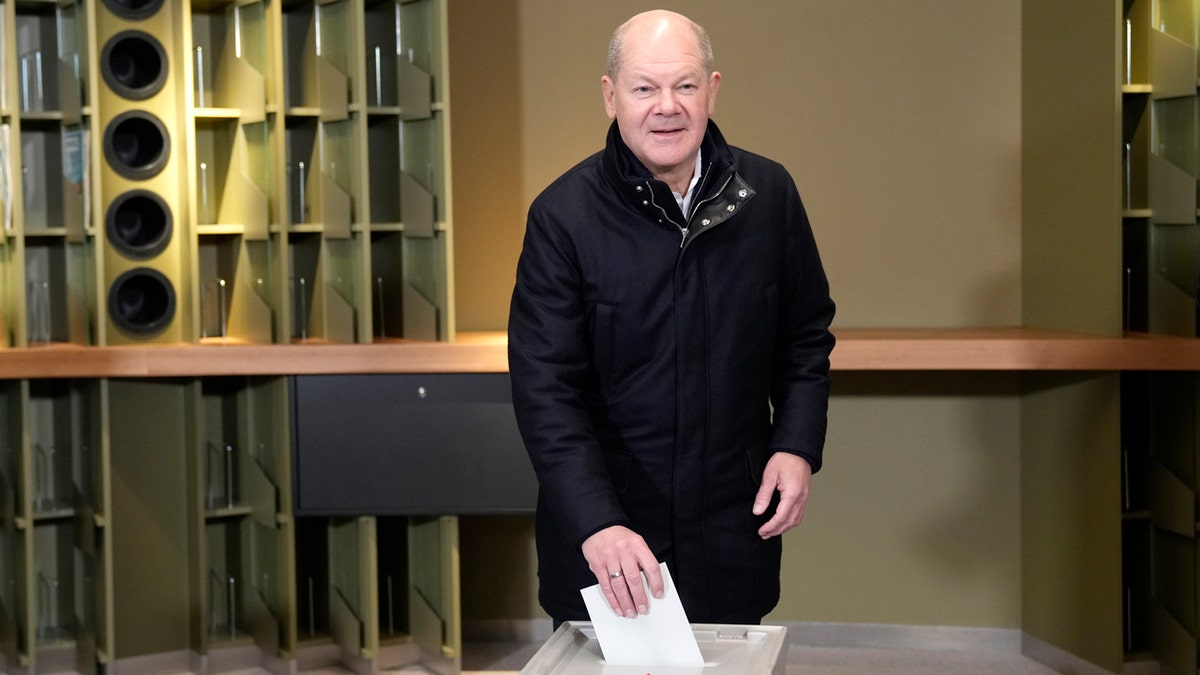
German Chancellor Olaf Scholz casts his vote at a polling station in Berlin, Germany, Sunday, on Feb. 23, 2025, during the German national election. (AP Photo/Ebrahim Noroozi)
What is the ‘firewall’ against AfD?
Mainstream German parties say they won’t work with any far-right parties threatening democracy, a postwar stance often referred to as a «firewall.»
That includes the Alternative for Germany (AfD) in Sunday’s election.
U.S. Vice President JD Vance in Munich earlier this month said there is no place for «firewalls,» drawing strong criticism from German leaders.
‘Make Germany great again’: Far-right party could see historic gains in Sunday’s election
The Alternative for Germany (AfD) party first entered parliament eight years ago on the back of discontent with the arrival of large numbers of migrants in the mid-2010s, and curbing migration remains its signature theme.
But the party has proven adept at harnessing discontent with other issues, too: Germany’s move away from fossil fuels, restrictions during the COVID-19 pandemic and support for Ukraine after Russia’s full-scale invasion nearly three years ago.
Bayern great Uli Hoeness speaks out against far right
Bayern Munich powerbroker Uli Hoeness says he would speak with any of the club’s players who support the far-right, anti-immigrant Alternative for Germany (AfD) party.
Hoeness, Bayern’s honorary president after more than 40 years at the forefront of the club, told Kicker magazine in an interview published Sunday that he would question any AfD-supporting player «and ask him if he still has all his tools in his toolbox.»
Hoeness previously spoke against AfD at a memorial service for Bayern great Franz Beckenbauer, arguing for the continuation of club projects that fight racism and discrimination.
«Bayern is a wonderful role model for migration and integration. More than half of our youth players have a migration background,» Hoeness told Kicker.
Trump’s relationship with Germany
Germany’s next government will be central to Europe’s response to U.S. President Donald Trump and his assertive new administration.
Chancellor Olaf Scholz said last month that a second Trump presidency will be «a challenge.»
Far-right leader Alice Weidel has vowed to «make Germany great again» in an echo of Trump’s campaign slogan.
Thousands protested against Merz ahead of Sunday’s vote
Tens of thousands of people across Germany in recent weeks have protested against the far-right Alternative for Germany (AfD) party and conservative front-runner Friedrich Merz for sending to parliament proposals for tough new migration rules that received AfD’s backing.
The demonstrators — and former German Chancellor Angela Merkel — say Merz broke «the firewall» against cooperation with anti-immigrant, far-right parties.
Merz insists his position is unchanged and that he didn’t and won’t work with the party.
Conservative leader and front-runner Friedrich Merz casts his vote in German election
Conservative leader and front-runner Friedrich Merz has cast his vote in the German election.
Merz is the leader of the center-right Union bloc, which has by far the best chance of forming a new government.
Merz voted Sunday in Arnsberg in western Germany, just minutes after his main rival, Chancellor Olaf Scholz. He is also facing environmentalist Greens candidate Robert Habeck and far-right leader Alice Weidel in the race for chancellor.
Habeck and Weidel voted early.
Sunday’s election comes as Germany and the rest of Europe grapples with the new Trump administration, the Russia-Ukraine war and security across the continent.
Scholz votes in German election that comes after his governing coalition collapsed
Chancellor Olaf Scholz has voted in a German election that comes after his governing coalition collapsed last year.
Scholz then lost a confidence vote, forcing President Frank-Walter Steinmeier to dissolve the parliament and schedule a new election.
Scholz voted Sunday in Potsdam, a city outside Berlin, and is facing opposition leader and front-runner Friedrich Merz, Vice Chancellor and environmentalist Greens candidate Robert Habeck and far-right leader Alice Weidel in the race for chancellor.
Who is Merz, the front-runner for chancellor?
Friedrich Merz, the current opposition leader, is the front-runner in the country’s election campaign.
His center-right Union bloc is leading polls.
The 69-year-old became leader of the Christian Democratic Union after Chancellor Angela Merkel stepped down in 2021, though he joined the party decades before.
German president votes
President Frank-Walter Steinmeier has cast his vote at a polling station in Berlin, according to the German news agency dpa. He is in his second term as president and hails from the center-left Social Democratic Party.
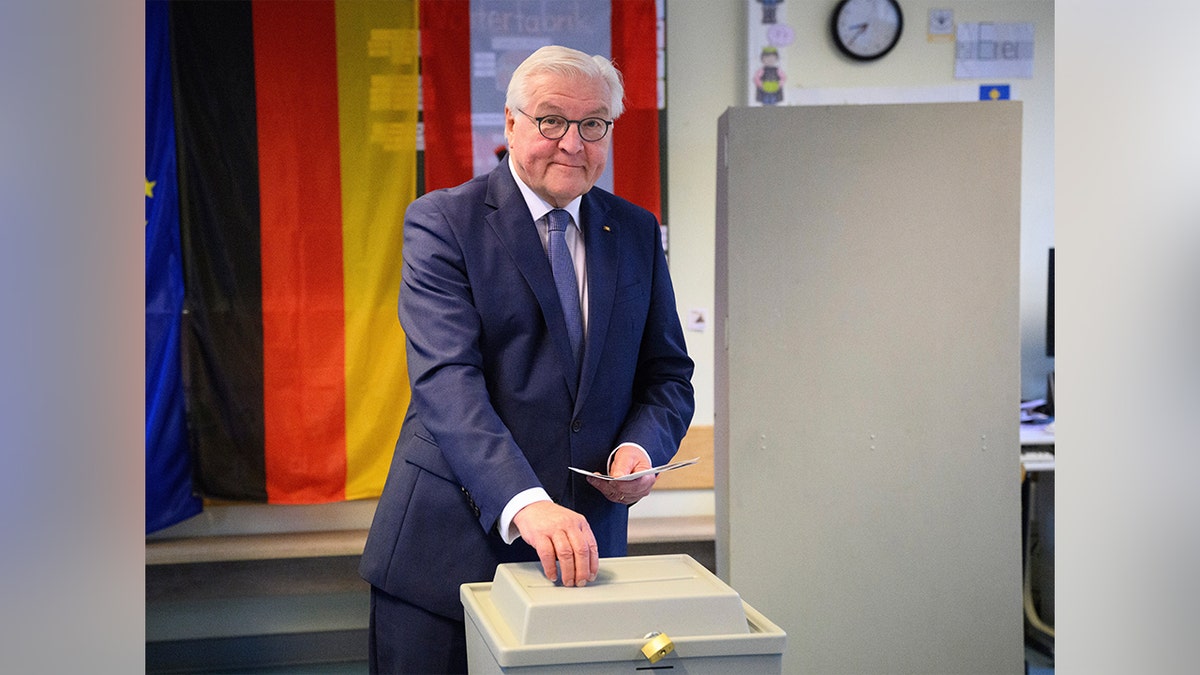
German President Frank-Walter Steinmeier casts his vote at a polling station in Berlin, Germany, on Sunday, Feb. 23, 2025, during the national election. (Bernd von Jutrczenka/dpa via AP)
The global importance of this election
Germany is the most populous country in the 27-nation European Union and a leading member of NATO. It will be central to shaping the continent’s response to the challenges of the coming years, including the Trump administration’s confrontational foreign and trade policies.
Leading contenders make final appeals
Merz vowed to revive the stagnant economy and defend Europe’s interests in the face of a confrontational U.S. administration. Scholz, meanwhile, insisted that he still hopes for an improbable last-minute comeback.
Who can vote?
German citizens aged 18 and up can vote. At least 59.2 million people in the nation of 84 million are eligible, about 2.3 million of them for the first time.
Polling stations are open from 8 a.m. to 6 p.m. local time.
Exit polls will be announced and vote-counting will begin immediately after voting ends. A final official result is expected early Monday.
The candidates for chancellor
Four candidates are bidding to be Germany’s next leader in Sunday’s election.
CLICK HERE TO GET THE FOX NEWS APP
The candidates are incumbent Chancellor Olaf Scholz, opposition leader Friedrich Merz, Vice Chancellor and environmentalist Greens candidate Robert Habeck and co-leader of the AfD Alice Weidel.
Polls have opened across Germany
Polls are now open across Germany in an election that could shape Europe’s response to the new Trump administration, the Russia-Ukraine war and security across the continent.
Why is Germany holding an election?
The election comes seven months ahead of schedule following the collapse of Chancellor Olaf Scholz’s three-party coalition in early November.
It’s only the fourth time the Bundestag has been dissolved ahead of schedule following a confidence vote under Germany’s post-World War II constitution.
INTERNACIONAL
Elección clave en Alemania: se imponen los conservadores con un fuerte crecimiento de la extrema derecha que obtiene el segundo lugar

El favorito
-
POLITICA1 día ago
Sorpresivo giro en el caso YPF: por una denuncia contra Cristina y Eskenazi, la jueza Preska podría revocar su fallo contra argentina por u$s 16.000 millones
-
CHIMENTOS1 día ago
Se filtró una foto de Susana Giménez en el sanatorio donde fue internada de urgencia su hija: “Está muy preocupada”
-
POLITICA3 días ago
Los 4.000 millones de Axel Kicillof que dejaron al descubierto las trampas de las licitaciones
-
POLITICA2 días ago
Polémica en la CPAC por el gesto de un exasesor de Donald Trump: “Hace referencia a la ideología nazi”
-
CHIMENTOS3 días ago
Santi Maratea deja las colectas y se embarca en un sueño personal
-
POLITICA2 días ago
Mauricio Macri acusó a Santiago Caputo de estar detrás de una “comisión trucha” por la Hidrovía



















